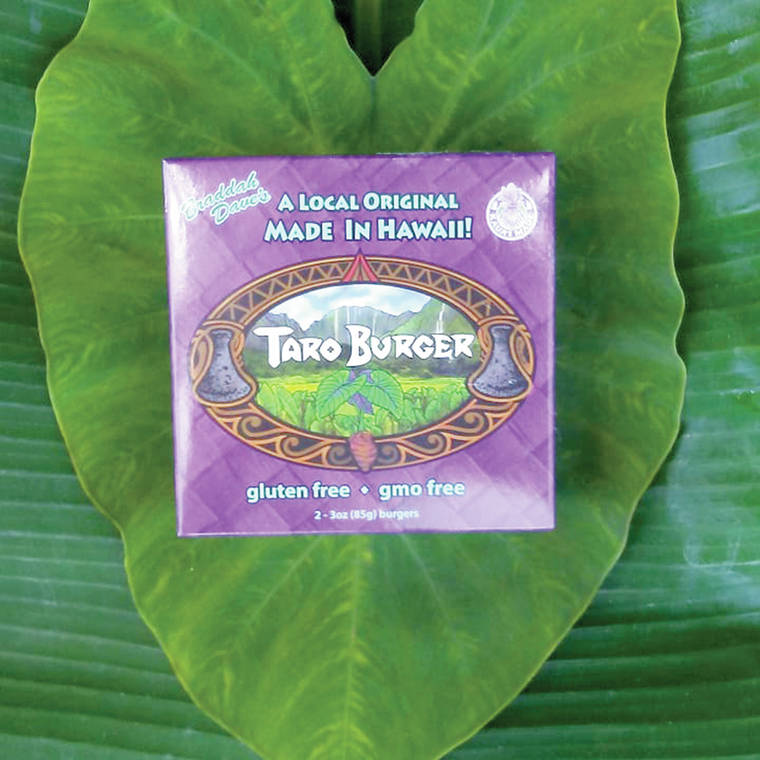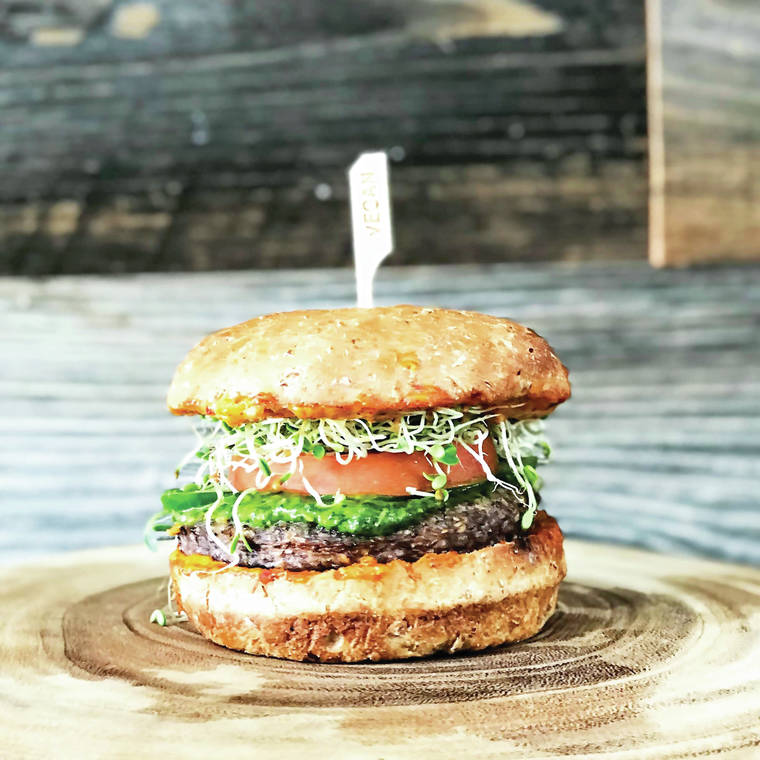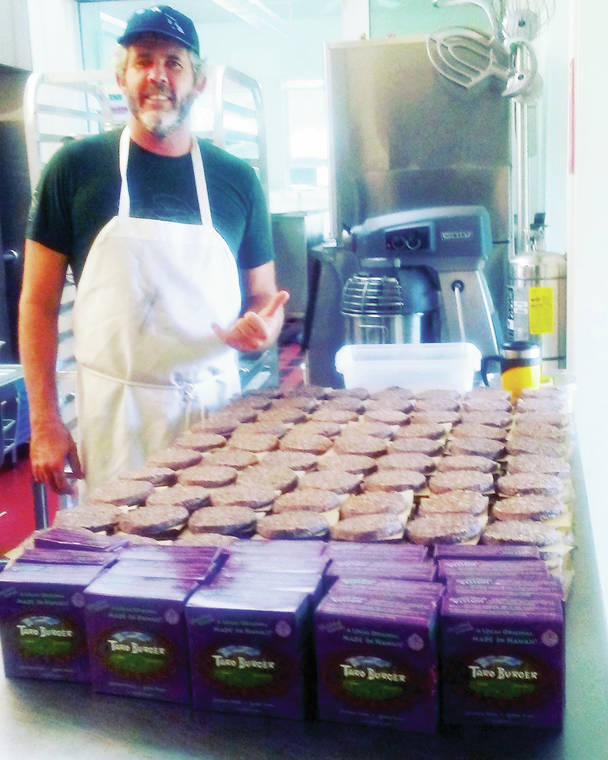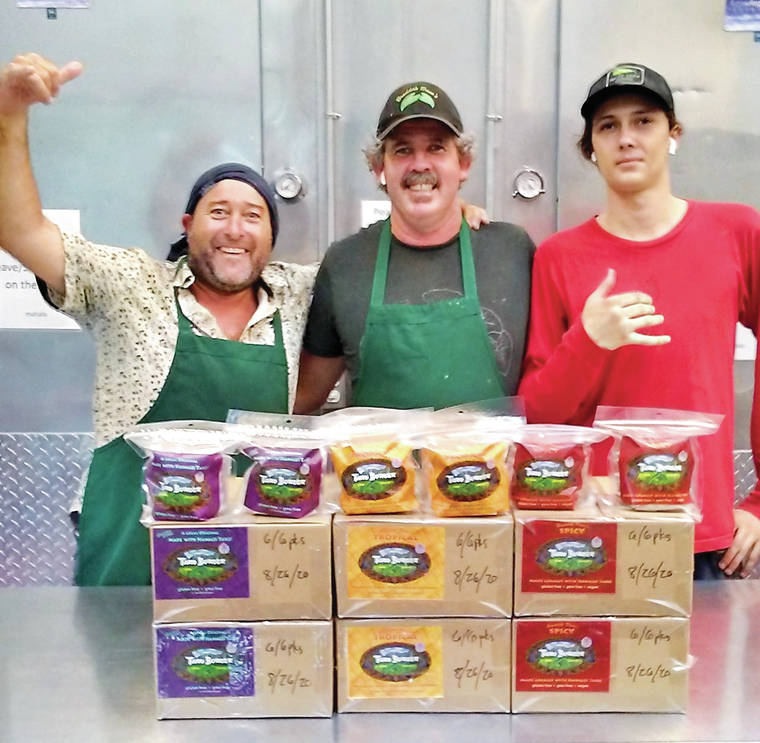Braddah Dave’s Taro Burger expands offerings




In 2011, a California native used the tools and knowledge he learned from the residents of Hawai‘i Island and started taking care of a small taro farm in Hanalei. The work inspired him to produce and distribute alternative meat products statewide while giving back to the farming community on the North Shore.
Wainiha resident and avid surfer David McEntee, aka Braddah Dave, owner of Braddah Dave’s Taro Burger, said he was working with the kupuna and taro farmers in the Waipio Valley before moving to Kaua‘i.
“I have been working with taro for 26 years,” McEntee said. “Then I had this idea, taro is such amazing food, if I can feed it to the more health-conscience people like me it would be a win-win. I could also be helping the taro farmers. I opened up a new farm on the other side of the valley. They gave me another lease when we had another flood,” McEntee said. “I watched it go down the river, a big flood came.”
When McEntee came back to Kaua‘i, he was offered a lease to take care of another taro farm right in front of the Hanalei post office.
“I came here because there was better surf,” McEntee said with a chuckle in his voice. “And I meet some really great friends that introduced me to Hanalei Poi co-owners that offered me a lease to take care of their taro.”
In 2012, McEntee opened Taro Burger, and makes all his products out of the Waipa kitchen, a new facility on private property in Waipa.
“Around that time I switched from farming to a value-added product, and so I started focusing on that rather than the farm, so I buy my taro from my friends in the valley of Hanalei,” McEntee said. “90 lbs of taro in a bag would cost me $60 dollars a bag but I like to pay the farmers a little more, $70 dollars – $10 dollars more to give back to the farmers because it’s such hard work.”
McEntee like other business owners did face some struggles when the pandemic hit, he took an 80% loss in statewide distribution sales while letting go of two independent contract workers, which left him with three core employees including himself and his son with shorter hours of operation.
“I have a mentor,” McEntee said. “She really has been directing me and helping me grow the business. When Hawai‘i reopened, we slowly saw our sales pickup. I am hoping to go global so I can inspire the youth to get into farming and to continue to help taro farmers by buying local.”
McEntee has a simple message for his loyal customers.
“Thank you so much for helping us through the difficult times,” McEntee said. “We are super grateful.”
According to McEntee, his taro burger became a huge success at local restaurants, local health food stores, and local hotels.
“You can find it at Hoku, Harvest Market, Papayas, Healthy Hut, and in Kilauea’s Foodland’s Market and Cafe,” McEntee said. “And the Wainiha Country Store will also be carrying our Taro burgers and Breakfast Kalo patties (frozen) as retail and I believe serving them hot for food service through the window.”
McEntee said his vision and goal is to provide a healthy food product that has been trusted throughout history.
“Our unique seasoning offers an easy to prepare, new, and flavorful way to enjoy the great health properties of taro,” McEntee said. “We believe that our taro burgers will help to perpetuate the taro farming communities and the culture of the Hawaiian Islands.”
All of his products are gluten, GMO, soy, and vegan free. It’s low calorie and nothing is artificial. And they have vitamins B, C &E and include fiber, protein, Omega 3’s, and antioxidants.
McEntee said he has recently came up with two new flavors and a new breakfast Kalo patty, also with three flavors.
“Besides the original flavor, I have a tropical version that includes pineapple and coconut with some garbanzo beans to add more proteins,” McEntee said. “It can become a complete food, and taro is a complex carbohydrate. I also have a spicy version made with chili pepper, paprika, garbanzo beans, and coconut cream.”
The new breakfast Kalo patties are seasoned with Italian herbs and taste like Italian sausage and are a great alternative for breakfast goers.
“You can eat healthier by replacing your eating habits with more vegetarian options,” McEntee said. “It tastes more like an artichoke heart and potatoes together. The patty is crispy on the outside and soft on the inside. It is also easy to prepare. They are frozen, and you can cook them for four minutes on one side and three minutes on the other side.”
McEntee said he likes to fry his Kalo patty with an egg-like a local moco and when he has taro leaves, he likes to cook them for 45 minutes into a taro stew. Each burger patties weigh three ounces each and his breakfast Kalo patties weigh two ounces each.
McEntee’s Wainiha friend, owner of Wainiha Country Market and Keiki Food Access &Farm to School Program Director Joell Edwards has known McEntee for two years.
“Dave is a local resident of Wainiha like me and he is a local producer,” Edwards said. “I have him in the farmer’s market. He is pretty amazing, and we been working hard to get producers like Dave into the Department of Education system.”
•••
Stephanie Shinno, reporter, can be reached at 245-0424 or sshinno@thegardenisland.com.

This is what makes America great. Free enterprise. I just ate a Garden deluxe burger from L & L BBQ drive in. This is a vegetable burger and it taste not bad and more for the healthy eaters. Making Taro Burger is a specialty some would love to eat year around. And I see they could grill the taro burger too.
Best plant burger I’ve ever had